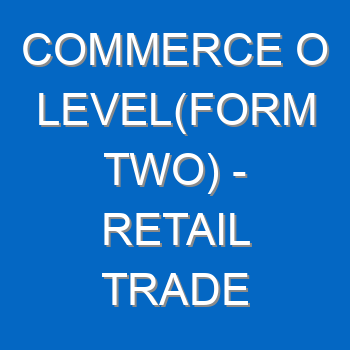Share this:
EXPORT TRADE
This is one of the branch of foreign trade dealing with selling of goods, raw materials or services to foreign countries.
It involves two main types;
- Direct export trade: This is when the sellers exports goods themselves it does not involve the use of agents.
- Indirect export trade: This is when export of goods and services is through appointed agents who work for a commission.
Advantages of direct exportation
- It involves the exporter himself and therefore reduce the cost of exportation. In this way exports can be sold cheaply in foreign markets and attract many customers hence big sales and profits.
- It enables the exporter to be familiar with the changing market conditions, in this case he can export goods more effectively.
Disadvantages of direct exportation
1. Exportation may be done inefficiently as the exporter may not be professionally sound enough to carry out exportation.
2. The exporter has to incur more distribution expenses through the use of intermediaries hence fall in profits and high price of exports which may lead to customers not to buy the products.
3.It does not allow the exporter to be familiar with real export process and actual foreign market environment as most of the tasks are performed by intermediaries.
4. Sometimes these intermediaries (middlemen) perform exportation in efficiently which results to losses to the export firms. It makes the exporter busy in both production and actual selling which can
lead to inefficiency and diseconomies of scale.
Advantages of indirect export
- High degree of assistance is attained in the process of export from professional export intermediaries hence more success in export business.
- There is high possibility of establishing and increasing the size of foreign markets through using various intermediaries.
- Export agents can perform many activities in the complicated foreign markets situations hence helping much in business.
- Export agents can assist in such activities like repacking and assembling of products which is of great help to producer.
Disadvantages of indirect exportation
- INTERMEDIARIES IN EXPORT TRADE
- Foreign commission agents: These are agents who sells the goods on behalf of the principal and remit the balance of money to the exporter after deducting commission and other expenses by them in the course of selling the goods. They are found in the foreign country where goods are to be sold.
- Exporters own representatives: These are exporters sales representatives based in the country to which products are to be sold, they collected orders from customers and sent them to the exporter for processing according to the terms of each order.
- Exporters brokers: They assist exporters to negotiate on ally terms in exporting the goods in return they are paid brokerage for performing the negotiation. They can be locally based or based in other countries.
- Marketing boards: They are mainly dealing with agricultural exports, selling produce to the agents of foreign buyers by auction or opening offices abroad to boost export of their produce e.g. coffee marketing board.
- Buying agents: Many overseas firms have their own buying agents in the country who buy the goods for their firms therefore local producers can sell the goods abroad through them.
IMPORTANCE OF EXPORT TRADE
- It encourages specialization among countries.
- It encourages economies of scale.
- It reduces scarcity of goods.
- It stimulates international understanding among countries.
- Enable a country to earn foreign exchange through export duties.
INFORMATION ON EXPORT TRADE
The type of information which are very important before exporting are as follows;
- Place of export (market).
- Kind/type of goods to export.
- Marketing strategies.
- Procedures and documentation.
- Rate of exchange e.g. Tshs Vs Kwacha.
- Distribution channel to be used.
- Trade policy and restrictions.
THE SOURCES OF EXPORT TRADE INFORMATION
- Board of external trade (BET): Provides trade information to both local traders and firm intending to buy goods from within the country.
- Chamber of commerce: This institution can give important information to intending exporters on firms and individuals who want to buy good from the country. Example in Tanzania chamber of commerce, industry and agriculture (TCCIA).
- Consular offices: Can give intending exporters a list of individuals and firms wishing to buy products from the country.
- International exhibition: Through which traders can exhibit their products and explain their merits to prospective customers who can place big orders.
- Ministries: In Tanzania we have the ministry of commerce and industries through its department of external trade which is responsible for promoting exports in the international market. I.e. from this department prospective exporter can get useful information on what to export.
- Other sources like:
-Reading international business newspapers, publications and magazines.
-Having personal inquiries to prospective importers in foreign countries.
-Visiting websites.
EXPORT PROCEDURES AND DOCUMENTATIONS IN TANZANIA
Every country has its own procedures in exporting goods but having the same use of documents. In Tanzania the following procedures must be carried into force
A. PRELIMINARY PROCEDURES
These are early procedures which includes;
i.Entering into export contract: Importer and exporter have to agree on some terms and conditions then sign the contract.
ii.Receiving an inquiry. The intended exporter receives a written request from a foreign buyer for information regarding the price and all other description on the goods he wants to buys example quality, quantity,features,time and methods of delivery and payments.
iii.Sending a quotation: The intended exporter sends a document giving descriptions on the goods to be sold.
iv.Receiving indent: After receiving quotation a foreign buyer (if satisfied with terms of sale) makes order by sending indent to the exporter.
An indent is an International order which states the exactly details of the goods required, date of delivery, shipment instructions methods of setting debs.
v.Applying and obtaining export license or permit: Some products require specific permit from the Government departments, institutions or controlling body legally empowered to provide license which allow the exportation according to set government conditions.
vi.Demanding a letter of credit: The exporter should demand a letter of credit from the importer, this letter of credit assures the payment from the importer.
B. EXPORT SHIPMENT PROCEDURES
After the exporter is satisfied with credit worthiness of the intended importer he makes arrangement for the shipping of goods.
i.Arranging for shipping goods: Due to complication in the shipping the goods as per formalities are concerned ,exporters can decide to
employ the clearing and forwarding agents. The shipping of goods arrangements includes the following formalities:
-Application for customs permit from customs office.
-Booking space in ship for carrying goods.
-Issue of shipping order. After the terms and conditions of shipment are settled, the shipping company issues a shipping order this is a
document evidencing a contract made between the shipping company and exporter or his agent.
-Attending various customs formalities.
-Placing goods on the clock.
-Receipt of the goods by the ship caption or his assistant.
-Sending documents to importer to allow him to collect the goods once they are delivered.
employ the clearing and forwarding agents. The shipping of goods arrangements includes the following formalities:
-Application for customs permit from customs office.
-Booking space in ship for carrying goods.
-Issue of shipping order. After the terms and conditions of shipment are settled, the shipping company issues a shipping order this is a
document evidencing a contract made between the shipping company and exporter or his agent.
-Attending various customs formalities.
-Placing goods on the clock.
-Receipt of the goods by the ship caption or his assistant.
-Sending documents to importer to allow him to collect the goods once they are delivered.
C. SECURING PAYMENT PROCEDURES
The exporter secures payments in settlement of the transactions in one of the following ways of financing foreign trade:
EXPORTER SHIPMENT PROCEDURE
– Bill of exchange.
– By getting a letter of credit issued in favour of exporter by the importers bank.
– Documentary credit.
– Documentary bill.
-Bank draft.
– Bill of exchange.
– By getting a letter of credit issued in favour of exporter by the importers bank.
– Documentary credit.
– Documentary bill.
-Bank draft.
INTERMEDIARIES IN EXPORT TRADE
The common used intermediaries in export trade are;
- Marketing boards.
- Foreign commission agents.
- Brokers.
- Representative offices.
- Buying agents.
INSTITUTIONS INVOLVED IN EXPORT TRADE IN TANZANIA
1.THE BOARD OF EXTERNAL TRADE(B.E.T.)
1.THE BOARD OF EXTERNAL TRADE(B.E.T.)
The board of external trade was instituted in 1997 and started operations in the same year.
FUNCTIONS AND OBJECTIVES OF THE BOARD
- To provide advisory services in external trade development policies and measures.
- To provide specialized assistance in the development of export products and technology to improve the quality and quantity of exports.
- To coordinate and monitor all export management programs including management of export targets and incentives.
- To provide functional advisory services in such areas as costing and pricing of exports, product adoption, packing for export, trade information, trade publicity, formulation of export marketing policies and plans and trade fair participation.
- Amelioration of basic infrastructure of export financing transport, fiscal and trade policies and development of export industries.
- Provision of useful information and education to local businessmen by organizing courses and seminars and assists them by providing in certain cases, export credit guarantee.
- To arrange exhibitions in foreign countries and inside the country to attract customers for Tanzania products.
ROLES OF THE BOARD OF EXTERNAL TRADE(B.E.T)
The board of External trade was established to perform the following objectives;
- To help industries find markets for their products throughout the world. It provides assistance increasing and developing Tanzanian exports by actively opening up new markets.
- To provide overseas businessmen wishing to trade with Tanzania with the information they need. The information provided coves Tanzania’s import and export trends.
2.T.P.A (Tanzania Port Authority)
This is an authority which dealing with controlling securities, shipments clearance of goods to and from other countries.
Roles/ Functions
- To ensure that there is adequate facilities for all cargo(goods) passing through their ports.
- To enforce securities of cargo in their ports.
- To ensure a speed, efficiency and smooth flow of cargo from sea transport.





